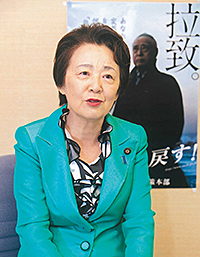
Talks were held in Stockholm in May between director-general-level Foreign Ministry officials from Japan and North Korea, during which North Korea agreed to perform a study of all Japanese nationals, including abductees. This marks the start of a new phase in relations between the two countries. On July 24, the LDP submitted an interim report on support for abductees to Prime Minister Shinzo Abe. We talked with Eriko Yamatani, Chairman of the Party's Headquarters for North Korean Abductions, about the key points in the interim report and her determination to resolve the issue.
Recommendation to establish a new support system Facilitating better life in Japan
―― North Korea's Special Investigation Committee is in the process of performing the study. What actions should the Japanese government take in the future?
Eriko Yamatani, Chairman of the Party's Headquarters for North Korean Abductions: In the past, it was North Korea's position that "the abduction issue has been resolved." I think what is happening now is a good first step--something that was stopped is now moving again--but North Korea is a very difficult country to deal with. While sanctions have been relaxed, I think we will have to take another look at it if it turns out they are being insincere.
He knows it is difficult, but Prime Minister Abe has decided to take steps to return all of the abductees to Japan as the talks proceed between the two governments. We in the Party need to do everything we can to support the Prime Minister Abe. The interim report that we submitted to the government is an example of our support.
―― What are the key points in the interim report?
Yamatani: The report makes three main points: (1) that the "abductee support" (maximum of 10 years) in the Act on Aid to Persons Abducted by North Korean Authorities and Other Relevant Persons will expire at the end of March next year; (2) that returning abductees are reaching retirement age but do not have adequate savings or pensions and will therefore require new assistance ; and (3) that we must make full preparations for the return of new abductees. From May onwards, the Project Team on Support for Abductees (Chairman: Ichiro Tsukada, Member of the House of Councillors) has been holding hearings with abductees who have returned and other groups involved in the issue. They have also been conducting studies on the ground.
Our basic approach is to facilitate life in Japan by providing as much assistance as possible, and doing it in a way that is both flexible and finely tuned to each individual. "Abductee support" is scheduled to expire, but we recommend extending it for new returnees and also establishing a permanent support system to supplement the incomes of the elderly.
The objective of the new support system would be to provide elderly returnees with peaceful, stable lives at the same level enjoyed by average citizens. It would therefore be based on the average income of elderly households, and would begin paying support when either the abductee or the spouse reaches 60 years of age. Prime Minister Abe was supportive when we presented the report to him and said that he would work with the Party to do everything possible.
―― What is on the schedule for the future?
Yamatani: Support for abductees is an issue that the ruling and opposition parties must work on together.
We plan to submit a bill to amend the Act on Aid to Persons Abducted by North Korean Authorities and Other Relevant Persons during next year's ordinary session of the Diet as a legislation introduced by Diet members. However, depending on the situation, we may submit it to the upcoming extraordinary Diet session instead. We will provide full explanations of the measures we have proposed and hope to gain the understanding of the opposition parties.
Doing everything possible to bring abductees home
―― Abductees' families are also aging. How committed are you to addressing these issues?
Yamatani: The government has certified 17 abductees (of which, five have returned to Japan), but the National Police Agency has 860 cases for which the possibility of abduction cannot be eliminated.
Solving the problem will require intense and tenacious diplomatic negotiations, but we also need to raise public awareness in order to provide the momentum. In March of this year, the United Nations Commission of Inquiry on Human Rights in the Democratic People's Republic of Korea (COI) published a final report in which it found "crimes against humanity" in North Korea, including the abduction issue. The United Nations Human Rights Council adopted a tough resolution in response. Now that the world is serious about solving the issues in North Korea, it is crucial that we enhance our international communications.
Since the "Association of the Families of Victims Kidnapped by North Korea" was formed in 1997, I have been with the members making speeches and attending meetings. Many of those family members have passed away during the intervening years. I am terribly sorry about this.
We cannot bring back the stolen years, but we can work together with the government to bring the victims back to Japan where they can live in peace with their families as soon as possible.










